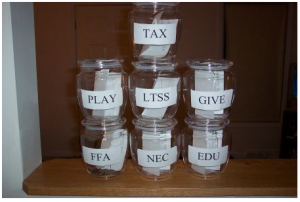The “Jar System” of Money Management…
 Back in 2005, a couple friends and I took a trip up to Montreal to attend a seminar sponsored by Peak Potentials Training, a company
Back in 2005, a couple friends and I took a trip up to Montreal to attend a seminar sponsored by Peak Potentials Training, a company
owned by T.Harv Eker, the author of the best selling book
"Secrets of the Millionaire Mind".
I've updated the article I wrote back then and included it below.
Here are some excerpts from the book...
"Wealthy people are not any smarter than poor people; they just have
different and more supportive money HABITS."
"It may not be the most glamorous of topics, but it comes down to
this: the single biggest difference between financial success and financial failure is how well you manage your money. It's simple: to master money, you must manage money."
"As for those who use the "I don't have enough money to manage"
rationale, they're looking through the wrong end of the telescope.
Rather than say "when I have plenty of money, I'll begin to manage
it", the reality is "when I begin to manage it, I'll have plenty of
money."
Saying "I'll start managing my money as soon as I get caught up" is
like an overweight person saying "I'll start exercising and dieting
as soon as I lose twenty pounds." It's putting the cart before the
horse, which leads to going nowhere...or even backward! First you
start properly handling the money you have, then you'll have more
money to handle."
***
At the seminar they outlined an amazingly simple money management
system involving 6 or 7 jars.
The jars are labeled like this:
FFA - Financial Freedom Account 10% of your after tax income goes
in here and is not taken out for anything other
than investments to build your PASSIVE income. Put something in
this account everyday...even if it's your pocket change.
NEC - Necessities - 50% of your after tax income goes in here and
is used for uh...necessities...food, shelter, clothing, car etc.
EDU - Education - 10% of your after tax income goes in here to be
used to improve yourself. Do you spend more at the coffee shop
than you do on your education...books, tapes, seminars etc?
LTSS - Long Term Saving for Spending - 10% of your after tax income
goes in here to be used for downpayments on houses or cars...big
ticket purchases like furniture etc. You could have 2 of these
jars and put 5% in each.
GIVE - Giving - 10% of your after tax income goes in here to be
used for charitable contributions.
PLAY - 10% of your after tax income goes in here for fun! You
spend this money every month or at the most every two months. He
suggests using this money to do or buy something a wealthy person
would. A limo ride?...a massage?...fancy shoes?...a Rolex?...it's
up to you but make sure it's something that really makes you happy
and/or is fun!
If, like me, you are self employed you'll need another jar labeled
TAX in which you put 20-30% of your income before you divide up the
rest to be put in your jars. (check with your tax expert)
Of course, it is a bit impractical and unsafe to put all that cash
into jars sitting in your kitchen so here is what I do...
I've opened 5 savings account at http://www.INGDirect.com and
named them FFA, EDU, LTSS, PLAY and TAX. I'm currently earning
3.4% on those accounts. (NOTE: Ing Direct is now Capital One 360
and they no longer pay 3.4% but rather .75%)
I keep the GIVE and NEC money in my local checking accounts for quick
access.
I've decided to do my jar updating on Sundays although I do put
pocket change in my FFA jar everyday.
In my jars I have a small notebook that notes the date and amounts
of my ING deposits.
Here are a few more quotes from the book if you need any
motivation...
"You must acquire the HABITS and skills of managing a small amount
of money before you can have a large amount. Remember, we are
creatures of habit, and therefore the habit of managing your money
is more important than the amount."
"Again, poor people thinks it's all about the income; they believe
you have to earn a fortune to get rich. Again, that's male
cow-manure! The fact is that if you manage your money following
this program, you can become financially free on a relatively small
income."
"If you mismanage your money, you can't become financially
free, even on a huge income. That is why so many high-income
professionals - doctors, lawyers, athletes, and even accountants -
are basically broke, because it's not about what comes in, it's
about what you do with what comes in."
***
At the seminar we were reminded that "visible is memorable" so put
your jars where you cannot miss them. Mine are in the kitchen.
Your friends will ask you about them. GREAT! Explain it to
them...if they laugh, GREAT! You'll be laughing all the way to the
bank.
If those percentages don't work for you right now...just do
whatever you can. Divide up whatever you can. Remember, it's not
the amount...it's the HABIT!
Let me know how it works for you.
